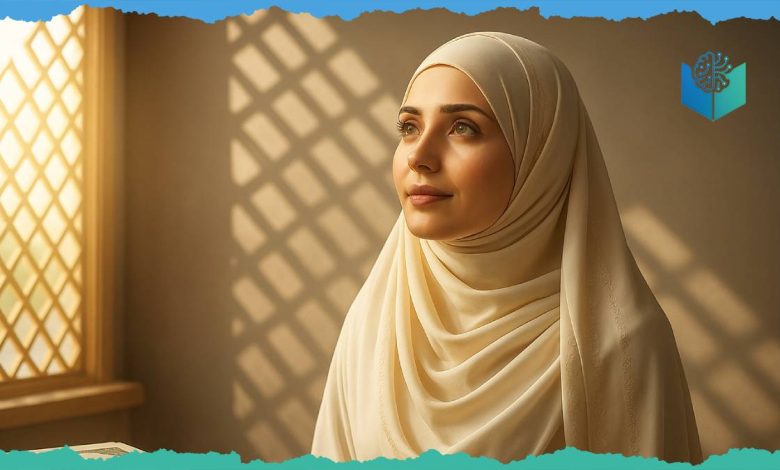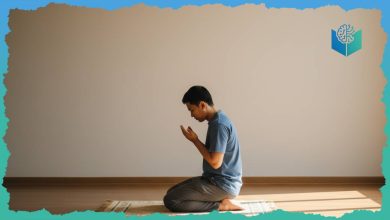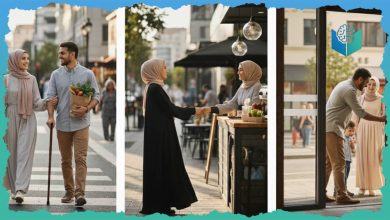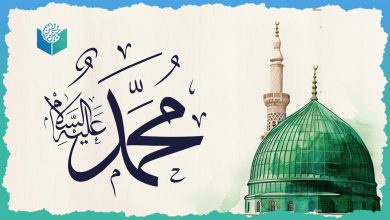Hijab in Islam

The concept of Hijab in Islam is one of the most discussed and sometimes misunderstood topics in the modern world. To many, the hijab is seen as a simple piece of cloth, but for Muslims, it carries far deeper spiritual, social, and personal meanings. The Quran presents the hijab as a symbol of faith, modesty, and dignity. It reflects not just an outward covering, but an inward devotion to Allah.
For anyone who wishes to learn more about Islam, exploring the meaning of hijab helps uncover how faith guides lifestyle, character, and identity.
What is Hijab in Islam?
When Muslims speak of hijab in Islam, it refers to modesty in behavior, speech, and dress. While most commonly understood as a head covering for women, the term “hijab” in Arabic literally means a barrier, cover, or partition.
The Quran instructs believing women to draw their coverings over themselves for modesty (Quran 24:31). Similarly, men are also commanded to lower their gaze and act with modesty (Quran 24:30). This shows that hijab is not limited to women’s clothing—it is a broader code of conduct.
Importance of Hijab in Islam
The importance of hijab is more than cultural or traditional; it is rooted in faith. For Muslim women, wearing the hijab represents a conscious choice to obey Allah and to align with the Islamic dress code.
Allah says: “O Prophet, tell your wives and your daughters and the women of the believers to bring down over themselves [part] of their outer garments. That is more suitable that they will be recognized and not abused.” (Quran 33:59)
This verse highlights both protection and identity as reasons behind the hijab. It safeguards dignity and allows a Muslim woman to be recognized for her faith and character, rather than just her appearance.

Spiritual Significance of Hijab
The spiritual significance of hijab lies in its reminder of devotion. By choosing to wear it, a believer demonstrates trust in Allah’s wisdom. It’s not simply about appearance but about aligning the heart with faith.
For many women, wearing hijab brings peace and empowerment because it constantly reminds them of their relationship with Allah. It becomes a symbol of humility before the Creator and an act of worship in daily life.
For those exploring about Islam, this illustrates that hijab is not forced spirituality but a chosen journey of obedience and connection.
Hijab and the Islamic Dress Code
The Islamic dress code is not only for women but applies to both genders. Men are instructed to dress modestly, avoid arrogance in clothing, and cover their bodies properly. Women are given specific guidelines for covering their hair, chest, and overall body with dignity.
The Quran emphasizes moderation and avoiding extravagance in dress: “O children of Adam, take your adornment at every masjid, and eat and drink, but be not excessive. Indeed, He likes not those who commit excess.” (Quran 7:31)
This shows that modesty in Islam is about balance—neither neglect nor excess, but dignity and humility.
Misconceptions about Hijab in Islam
One of the biggest misconceptions is that the hijab is oppressive. In truth, the hijab empowers women by shifting the focus from physical appearance to character, intellect, and faith.
Another misconception is that hijab is a cultural tradition rather than a divine command. But the Quran clearly outlines modest dress as an obligation, making it a spiritual practice, not just a cultural symbol.
For anyone curious about Islam, understanding the hijab requires looking beyond stereotypes and focusing on the divine wisdom behind it.
Hijab as an Act of Identity
The hijab also serves as a strong marker of Muslim identity. For women, it outwardly expresses belonging to the Muslim Ummah and signals faith. It builds a sense of community while strengthening inner values.
In societies where modest dress may not be the norm, wearing the hijab can be an act of courage and pride, reminding the believer of their spiritual commitment in every setting.

Lessons from the Quran on Modesty
The Quran frequently addresses modesty, reminding both men and women that true dignity lies in piety, not in appearance or wealth.
Allah says: “But the clothing of righteousness – that is best.” (Quran 7:26)
This verse shows that while the physical hijab is important, the inner hijab—guarding one’s heart from arrogance, immorality, and disobedience—is equally essential.
Hijab and Inner Morality
Wearing hijab is not complete without practicing good manners, honesty, and humility. A woman who wears the hijab but harms others with her words or actions misses its deeper meaning.
Thus, hijab is both outer modesty and inner refinement. For men, the same applies: lowering the gaze, speaking respectfully, and dressing modestly are part of spiritual hijab.
This holistic view of modesty is what makes the hijab such a central part of the Islamic dress code.
The Importance of Hijab for Muslim Men
While hijab is often associated with women, Islam places responsibility on men first. The Quran instructs: “Tell the believing men to lower their gaze and guard their private parts. That is purer for them.” (Quran 24:30)
This makes it clear that men must also practice modesty, respect, and humility. Hijab in Islam is therefore a shared responsibility, not a burden placed on women alone.

Benefits of Hijab in Daily Life
There are many practical and spiritual benefits of wearing hijab:
- Spiritual peace: Constant reminder of faith.
- Self-respect: Protects dignity and shifts focus to character.
- Identity: Strengthens belonging to the Muslim community.
- Protection: Guards from unwanted attention and harm.
These benefits reflect how the hijab is both a personal shield and a public declaration of faith.
Hijab in the Modern World
In today’s society, hijab can often spark debate. Yet, many Muslim women proudly wear it in workplaces, schools, and public spaces, proving that faith and modern life can coexist.
The hijab challenges shallow beauty standards and emphasizes depth of character. For those exploring about Islam, this is a reminder that Islam encourages believers to live their faith in all environments without compromise.
Hijab and Women’s Empowerment
Contrary to misconceptions, many Muslim women find empowerment in hijab. It allows them to define beauty on their terms, focusing on intellect, personality, and spirituality.
The act of choosing hijab is often one of strength and independence, showing that obedience to Allah comes before societal expectations.
Hijab as a Daily Act of Worship
The hijab is more than clothing—it is a daily act of worship. Just as prayer and fasting are repeated acts of devotion, wearing hijab is a constant reminder of faith in action.
By choosing modesty every day, a Muslim woman affirms her identity as a servant of Allah and lives out the spiritual significance of hijab.
Conclusion: Hijab as Faith, Dignity, and Devotion
The hijab in Islam is more than fabric; it is faith in action. It carries spiritual, personal, and communal meaning, reminding Muslims to live with dignity and humility. The importance of hijab lies in its ability to protect, empower, and spiritually elevate the believer.
The spiritual significance of hijab is that it connects the outer appearance to the inner heart, balancing devotion and daily life. As part of the Islamic dress code, hijab is both an obligation and an honor.
For those who wish to explore the deeper meaning of modesty and faith, visit ayaat.ai, a resource that connects believers to the guidance of the Quran and helps them learn more about Islam.
Q&A
Is it mandatory to wear hijab in Islam?
Yes, the Quran makes modest dress obligatory for believing women (Quran 24:31, 33:59). It is a command from Allah, not a cultural choice.
Why does Allah want us to wear hijab?
Allah commands hijab to protect dignity, promote modesty, and remind believers that true worth lies in piety, not appearance. It is both an act of obedience to Him and a shield that nurtures spiritual purity and self-respect.
Can hijab be stylish?
Yes, modesty in Islam does not forbid beauty or cleanliness. The key is that clothing should not be tight, transparent, or immodest.
Do men have hijab in Islam?
Yes, men’s hijab is lowering the gaze, dressing modestly, and avoiding arrogance or immorality.





